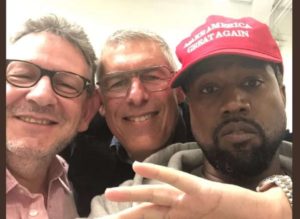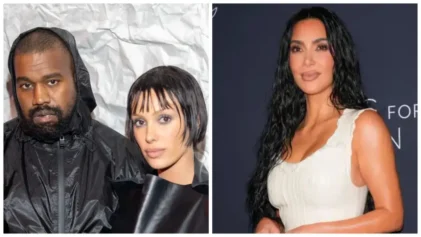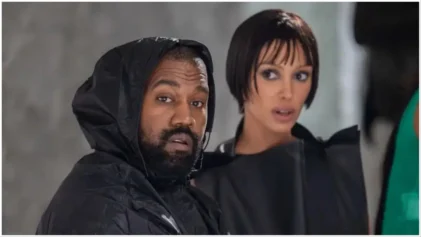
The recent remarks by Kanye West and his support for Trump are a reminder that Black voters should hold Democrats accountable and make sure the party does not take them for granted. (Photo: Twitter)
Kanye West Ignorantly Stumbles into Important Debate About Whether Blacks Can Hold Democratic Party Accountable
With the recent comments by Kanye West claiming slavery is a choice and calling the Democrats the party of slavery, and the artist’s praise for Donald Trump and wearing of a “Make America great Again” hat have resulted in increased support for West and an opportunity for him to build his Republican fan base. “Abe Lincoln freed and protected the slaves and he was republican,” West tweeted. “Republicans were the ones who’s helped black people … democrats protected the rights of the slave owners in the South.”
Republicans have used the opportunity to criticize Democrats and scrutinize Black people’s allegiance to the party, a conversation Black people should have. Chance the Rapper defended Kanye, challenging Black political allegiances and party fidelity and arguing that Black people do not have to be Democrats.
Black people don’t have to be democrats.
— Chance The Rapper (@chancetherapper) April 25, 2018
Next President gon be independent
— Chance The Rapper (@chancetherapper) April 25, 2018
Chance the Rapper later apologized but still insisted that Democrats in Chicago have not addressed poverty or violence. “My statement about black folk not having to be democrats (though true) was a deflection from the real conversation and stemmed from a personal issue with the fact that Chicago has had generations of democratic officials with no investment or regard for black schools, neighborhoods, or black lives,” he said. “We have to talk honestly about what is happening and has been happening in this country and we have to challenge those who are responsible, as well as those who are giving them a pass,” the rapper concluded. “If that happens to include I love, someone who is my brother-in-Christ and someone who I believe does really want to do what is right, it’s not my job to defend or protect him. It’s my job [to] pick up the phone and talk to him about it.”
My fault yo pic.twitter.com/TIWhG8o1ST
— Chance The Rapper (@chancetherapper) April 27, 2018
Chance the Rapper’s critique of the Democratic Party and its failure to meet the social and economic needs of the Black community reflect a necessary internal conversation on holding Democrats accountable, and making the political system serve the uplift of Black people.
For about 70 years after the Civil War, Black people were resoundingly Republican and a key GOP voting bloc, with an estimated ouglass, the Thirteenth, Fourteenth and Fifteenth Amendments and the Freedmen’s Bureau. Times changed and parties changed through a political realignment of which West was not aware, because he does not read, and the Republican party emerged as the 2,000 Black elected officials during Reconstruction–reflecting the party of Abraham Lincoln and Frederick Dparty of the Southern Strategy and white grievance, while Black people found themselves overwhelmingly Democratic at a rate of 80 to 90 percent. Republicans have demonstrated antipathy towards African-Americans by opposing civil rights, social programs and economic development.
Tell your man yes the southern Dixiecrats WERE racist, BUT in 1964 LBJ signed the civil rights act and they left Dems to become southern base of the GOP, fact. Look up Nixon’s “southern strategy” Ye the Dodgers used to play in Brooklyn too,they’re not the same team playing I. LA
— Nik Carter (@TheNotoriousNIK) April 30, 2018
However, Democrats have faced accusations of taking Black voters, their most loyal voting bloc, for granted, and not only failing to deliver for but enacting policies that stand against their interests. Despite the enactment by liberals of Civil Rights Act of 1964 which ended Jim Crow segregation, systemic, structural racism and de facto segregation that plagued cities such as Chicago, Los Angeles, New York and Philadelphia were not eradicated, and redlining, school zoning, housing segregation and covenants persisted. More importantly, lack of enforcement of key anti-discrimination and anti-poverty measures such as the Civil Rights Act of 1964, the Elementary and Secondary Education Act of 1965 and the Fair Housing Act of 1968 and the gutting of the Voting Rights Act have exacerbated the inequities for Black people.

Bill Clinton on the Arsenio Hall Show in 1992. (photo: AP)
Democratic political leaders are responsible for policies that maintain structural racism. During the 1992 presidential campaign, then-Arkansas Gov. Bill Clinton — who would later be called ‘the first Black president” years before Barack Obama —oversaw the execution of a mentally disabled Black man named Ricky Ray Rector. Lobotomized from an attempted suicide, Rector was so disabled that he said he would save the pecan pie from his last meal for later. In 2002, the U.S. Supreme Court ruled that the death penalty for the mentally disabled amounted to cruel and unusual punishment. For Clinton, the execution of Rector was an appeal to white voters at the expense of Black voters, as was his condemnation of Sister Souljah for saying “If black people kill black people every day, why not have a week and kill white people?”
Further, Clinton’s vow to “end welfare as we know it” by enacting welfare reform was a racist dog-whistle that eviscerated welfare and halted his party’s commitment to fighting poverty. This, in an effort to attract white voters who, according to focus groups viewed Democrats as the “giveaway party, giving white tax money to blacks and poor people.”
Clinton’s 1994 Violent Crime Control and Law Enforcement Act was a staggering $30 billion crime package, the largest crime control bill in U.S. history, which critics credit with the decimation of communities of color. It was filled with punitive measures such as a “three strikes” mandatory life sentence, $9.7 billion for prisons, an increase in crimes eligible for the death penalty, and funding for 100,000 new police officers, among other measures. President Clinton later apologized for his role in fueling mass incarceration in the Black community through this crime bill, which provided a stumbling block for the 2016 presidential aspirations of his wife Hillary. While Hillary Clinton the candidate had to come to terms with her depiction of Black children as “superpredators” in 1996, her Democratic opponent Bernie Sanders faced criticism for opposing slavery reparations — a measure which a majority of African-Americans support according to polls — as they were pressured by Black Lives Matter to show a strong stance on issues affecting the Black community.
Barack Obama, the first Black president, faced pushback for not helping Black people more. Not wanting to be seen as the president of Black America, critics argue, Obama bailed out the banks and the auto industry but not African-Americans during the devastating foreclosure crisis. Black wealth was destroyed in the Obama years, with Black people losing half their wealth in the Great Recession, as the administration protected the financial system at the expense of homeowners. Black households victimized by subprime mortgages lost their homes amid mass foreclosures.
Today, in a nation that ranks 34th of 35 developed nations in terms of the well-being of its children, Black children are four times as likely as whites to be in poverty.
In the post-Obama era, Black voter participation dropped in 2016 with Obama no longer on the ballot, and with a skeptical Black electorate that needs convincing in order to be mobilized. Yet, the power of a mobilized Black voting bloc was evident in recent elections such as the Alabama Senate race and the Virginia gubernatorial race in 2017, and other contests around the country. These successes were a testament to grassroots mobilization strategy that specifically courted Black voters, addressed racial justice issues, and assumed there was no such thing as too much voter contact. This stands in contrast to the traditional Democratic tendency to gloss over Black concerns and assume they do not have to be persuaded to vote for the ticket. Groups such as Democracy In Color and Black PAC and Collective PAC who are striving to make the party more inclusive believe the Democrats took Black voters for granted in 2016 with an all-white presidential ticket, no mobilization in the Black community until Labor Day, and by failing to address Trump’s racist comments rather his temperament.
According to “Autopsy: The Democratic Party in Crisis” — an independent autopsy of the 2016 election — the Democrats chased Republican voters while losing ground with their base. This base includes people of color — particularly Black women — working-class voters in general, and young people, “who encounter a toxic combination of a depressed economic reality, GOP efforts at voter suppression, and anemic messaging on the part of Democrats.” The Clinton campaign and a predominantly white party leadership “spent lavishly” on white suburban Romney voters to capitalize on Trump’s lack of decency, yet invested little in communities of color. Minority contractors accounted for only 1.7 percent of contractors in recent election cycles.
For those who are disillusioned by the two-party system, dissatisfaction does not necessarily mean support for the Republican Party. While a third party splitting the vote would force the Democrats to address Black concerns, a system of proportional representation such as ranked choice voting would amplify the political voices of Black voters who are often marginalized and their issues not taken seriously, while avoiding the pitfalls of third-party spoilers.
Democrats and others who court the Black vote must deal with the racial wealth gap. White families with an employed head of household has ten times the wealth of their black counterparts, while white households with an unemployed breadwinner have more wealth than a Black home where the head is working all the time, and a college educated Black household is not worth as much as a white family headed by a high school dropout. As Antonio Moore, William Darity of Duke University, and Darrick Hamilton of the New School found in their report “What We Get Wrong About Closing the Racial Wealth Gap,” Black households hold less than seven cents on the dollar compared to whites. Blaming the wealth gap on Black defectiveness and so-called dysfunctional personal behavior, and placing the burden on Black people to work harder to bridge the gap with whites will not work, the authors argue, nor will educational attainment alone.
“Addressing racial wealth inequality will require a major redistributive effort or another major public policy intervention to build black American wealth,” the report says. “This could take the form of a direct race-specific initiative like a dramatic reparations program tied to compensation for the legacies of slavery and Jim Crow, and/or an initiative that addresses the perniciousness of wealth inequality for the entire American population, which could disproportionately benefit black Americans due to their exceptionally low levels of wealth. Indeed, the two strategies — reparations for America’s record of racial injustice or the provision of the equivalent of a substantial trust fund for every wealth poor American — need not be mutually exclusive.”
In the post-Obama era, Black electoral politics is taking a new look and feel, with a new generation of candidates, activists and strategists taking a decidedly progressive philosophy. They are authentic, unabashed in their treatment of issues such as racism, policing and inequality, and will not ask for approval to proceed. If the Democratic Party is to have a new relationship with Black voters and be responsive to their needs, it will require new leadership that does not equate with white men, or a strategy that involves Black outreach a week before Election Day.


